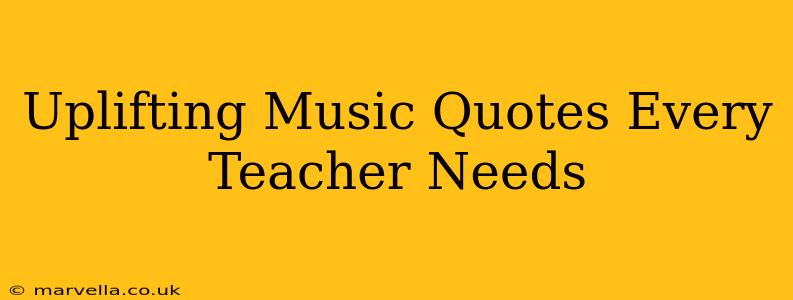Teaching is a demanding yet incredibly rewarding profession. It requires passion, resilience, and an unwavering belief in the power of education. Sometimes, amidst the challenges of lesson planning, grading papers, and connecting with students, a little inspiration is needed. Music, with its ability to evoke emotion and uplift the spirit, can be a powerful source of that inspiration. This collection of uplifting music quotes offers encouragement and perspective for every educator facing the unique joys and struggles of their daily work.
Why Music Matters to Teachers
Before diving into the quotes themselves, let's consider why music is so vital for teachers. It's more than just a background hum; it's a tool for:
- Stress Relief: The demanding nature of teaching can lead to burnout. Listening to uplifting music can significantly reduce stress and improve mood.
- Creativity Boost: Music can spark creativity, aiding in lesson planning, developing engaging activities, and fostering a more imaginative classroom environment.
- Emotional Regulation: Music helps process emotions, which is crucial for navigating the complexities of student interactions and classroom management.
- Connection with Students: Sharing music and discussing its impact can create a stronger bond with students, fostering a more positive and inclusive classroom atmosphere.
Uplifting Music Quotes for Teachers
Here are some inspiring quotes about music that perfectly resonate with the challenges and triumphs of the teaching profession:
"Music washes away from the soul the dust of everyday life." —Berthold Auerbach This quote beautifully captures the restorative power of music, offering a much-needed respite from the daily grind of teaching. It reminds us to take time for self-care and rejuvenation.
"Music is the universal language of mankind." —Henry Wadsworth Longfellow As educators, we strive to connect with students from diverse backgrounds. Music transcends cultural barriers, creating a shared experience that unites individuals.
"Music is the mediator between the spiritual and the sensual life." —Ludwig van Beethoven Teaching is a deeply spiritual endeavor, involving nurturing young minds and shaping futures. Music connects the intellectual with the emotional, mirroring the multifaceted nature of the teaching profession.
"Without music, life would be a mistake." —Friedrich Nietzsche This powerful statement highlights the integral role music plays in enriching human experience. It reminds us of the importance of incorporating music and the arts into our classrooms and lives.
"Life is a song—sing it." —Rumi This quote inspires teachers to embrace the journey of teaching with passion and enthusiasm. It's a call to live each day to the fullest and find joy in the work.
What are some of the benefits of listening to music while working?
Listening to music while working, especially for teachers involved in tasks like grading papers or lesson planning, can offer several benefits:
- Improved Focus and Concentration: The right kind of music can create a focused atmosphere, minimizing distractions and improving concentration.
- Increased Productivity: Music can enhance mood and motivation, leading to increased efficiency and productivity.
- Reduced Stress and Anxiety: Uplifting music helps manage stress, leading to a more relaxed and productive work environment.
- Enhanced Creativity: Certain types of music can stimulate creativity and inspire new ideas.
What genres of music are best for concentration and focus?
The best genre of music for concentration often depends on individual preference. However, generally, instrumental music, particularly classical music (often referred to as "classical music for focus"), ambient music, and lo-fi hip hop are popular choices due to their lack of distracting lyrics. Experiment to find what works best for you.
How can music be incorporated into the classroom setting?
Music can be effectively integrated into various aspects of the classroom:
- Lesson Enhancement: Use music to introduce new concepts, create atmosphere, or highlight key themes.
- Classroom Activities: Incorporate music into games, projects, or presentations to make learning more engaging.
- Emotional Regulation: Use calming music during transitions or stressful moments to promote a peaceful classroom environment.
- Student Expression: Encourage students to create their own music or explore different genres as part of their learning experience.
What is the impact of music on learning?
Studies have shown that music can have a positive impact on learning by:
- Improving Memory and Cognitive Function: Music can enhance memory and cognitive skills, making it easier for students to retain information.
- Boosting Motivation and Engagement: Engaging music makes learning more enjoyable and increases student participation.
- Enhancing Emotional Connection: Music can create a more positive and supportive learning environment, strengthening the bond between teacher and students.
In conclusion, the uplifting power of music is a valuable resource for every teacher. By incorporating music into their personal lives and classroom environments, educators can cultivate a more positive, productive, and fulfilling experience for themselves and their students. Remember to embrace the beauty of music and let its inspirational force guide you on your teaching journey.

